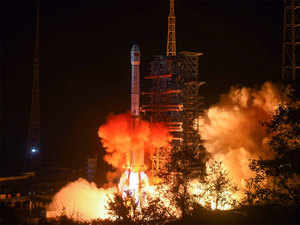 Agencies
AgenciesBEIJING: A Chinese spacecraft landed on the moon Tuesday to bring back lunar rocks to Earth for the first time since the 1970s, the government announced.
The Chang'e 5 probe "successfully landed" at its planned site, state TV and news agencies reported, citing the China National Space Administration. They didn't immediately announce any more details.
The lander was launched Nov. 24 from the tropical southern island of Hainan. It is the latest venture by a Chinese space program that sent its first astronaut into orbit in 2003, has a spacecraft en route to Mars and aims eventually to land a human on the moon.
Plans call for the lander to spend about two days drilling into the lunar surface and collecting 2 kilograms (4.4 pounds) of rocks and debris. The sample will be lifted up into orbit and transferred to a return capsule for the trip to Earth.
If it succeeds, it will be the first time scientists have obtained fresh samples of lunar rocks since a Soviet probe in the 1970s.
U.S. astronauts with NASA's Apollo space program brought back 842 pounds (382 kilograms) of lunar samples from 1969 to 1972.
The Chang'e 5 flight is China's third successful lunar landing. Its predecessor, Chang'e 4, was the first probe to land on the moon's little-explored far side.
The latest flight includes collaboration with the European Space Agency, which is helping to monitor the mission.
China's space program has proceeded more cautiously than the U.S.-Soviet space race of the 1960s, which was marked by fatalities and launch failures.
In 2003, China became the third country to send an astronaut into orbit on its own after the Soviet Union and the United States. It also launched a crewed space station.
Chinese space officials have said they hope eventually to land a human on the moon, but no time line or other details have been announced.
China, along with neighbors Japan and India, also has joined the growing race to explore Mars. The Tianwen 1 probe launched in July is on its way to the red planet carrying a lander and a rover to search for water.
The Chang'e 5 probe "successfully landed" at its planned site, state TV and news agencies reported, citing the China National Space Administration. They didn't immediately announce any more details.
The lander was launched Nov. 24 from the tropical southern island of Hainan. It is the latest venture by a Chinese space program that sent its first astronaut into orbit in 2003, has a spacecraft en route to Mars and aims eventually to land a human on the moon.
Plans call for the lander to spend about two days drilling into the lunar surface and collecting 2 kilograms (4.4 pounds) of rocks and debris. The sample will be lifted up into orbit and transferred to a return capsule for the trip to Earth.
If it succeeds, it will be the first time scientists have obtained fresh samples of lunar rocks since a Soviet probe in the 1970s.
U.S. astronauts with NASA's Apollo space program brought back 842 pounds (382 kilograms) of lunar samples from 1969 to 1972.
The Chang'e 5 flight is China's third successful lunar landing. Its predecessor, Chang'e 4, was the first probe to land on the moon's little-explored far side.
The latest flight includes collaboration with the European Space Agency, which is helping to monitor the mission.
China's space program has proceeded more cautiously than the U.S.-Soviet space race of the 1960s, which was marked by fatalities and launch failures.
In 2003, China became the third country to send an astronaut into orbit on its own after the Soviet Union and the United States. It also launched a crewed space station.
Chinese space officials have said they hope eventually to land a human on the moon, but no time line or other details have been announced.
China, along with neighbors Japan and India, also has joined the growing race to explore Mars. The Tianwen 1 probe launched in July is on its way to the red planet carrying a lander and a rover to search for water.
(Catch all the Business News, Breaking News, Budget 2024 News, Budget 2024 Live Coverage, Events and Latest News Updates on The Economic Times.)
...moreDownload The Economic Times News App to get Daily Market Updates & Live Business News.
Subscribe to The Economic Times Prime and read the ET ePaper online.
Read More News on
(Catch all the Business News, Breaking News, Budget 2024 News, Budget 2024 Live Coverage, Events and Latest News Updates on The Economic Times.)
...moreDownload The Economic Times News App to get Daily Market Updates & Live Business News.
Subscribe to The Economic Times Prime and read the ET ePaper online.





